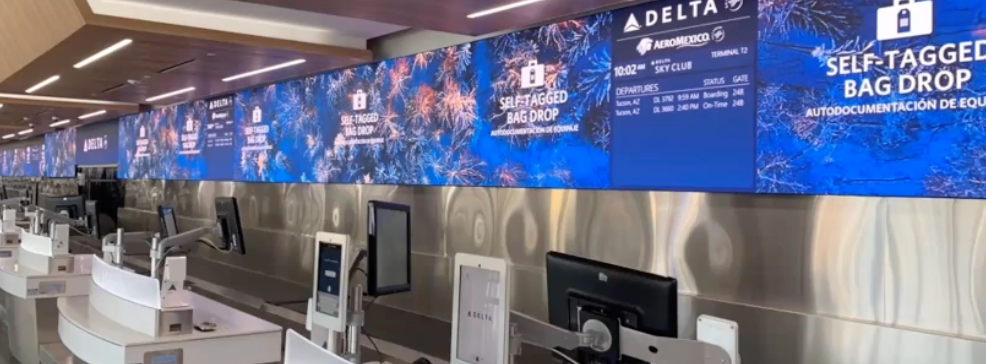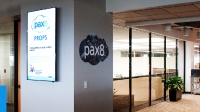Why Digital Signage is the Future for Customer and Employee Communications
By
— June 28th, 2024

Organizations today are more aware than ever of how customer experience is deeply linked to the workplace experience of their employees—and that highly effective communication is key to both.
But achieving this isn’t easy. People—customers and employees alike—are time-poor and oversaturated, with information coming at them from all directions. So, companies must use multiple communication channels to reach and grab those valuable seconds or minutes of customer and employee attention.
However, in this fast-paced world, one communication channel has emerged as a standout solution for both the customer and employee audience, and that’s digital signage, utilizing high-definition displays and visually attractive content to deliver information in a way that is both informative and engaging.
Digital Signage Supercharged: Elevating Engagement with User-Generated Content
Think of it this way. Imagine a vibrant display in your employee breakroom showcasing upcoming company events, team member achievements, and key performance indicators (KPIs). Now, think about customers in your retail store greeted by dynamic displays showcasing new products, special offers, and personalized recommendations. This is the power of digital signage: transforming static communication into a dynamic and interactive experience.
While many people might think of digital signage solely in terms of advertising screens, many organizations are now looking to Poppulo’s digital signage for both their customer and employee communications—and this trend is growing rapidly.
So, what does this look like in real life? A great example is Delta Air Lines, where digital signage is key to delivering exceptional passenger experience and driving operational efficiencies.
In many ways, the Delta digital signage success story is a microcosm of how a company might initially use digital signage for one purpose and, because of its effectiveness, expand its usage into another sphere of business operation.
At Delta Air Lines, digital signage was initially deployed on a small scale for communicating with employees who didn’t have access to computers or even mobile phones, and expanded over time into a critical channel for enhancing the passenger experience.
From the minute passengers arrive at New York’s La Guardia airport,eye-catchingdigital signage acts as a directional aide and is even used to create a calming effect at the check-in areas.

While on the employee side, the same digital signage system, powered by Poppulo, gives airport workers important information in real-time. This information can relate to anything from cargo-to-aircraft delivery deadline updates to rapid ramp closure alerts.
(For more use cases, best practices, and tips for driving value with Poppulo’sDigital Signage, check out this free guide here)
What other types of companies or organizations can reap rewards by using digital signage to get in front and capture the attention of both customers and employees? Basically, any company with a customer-facing side to their business. This can range from hotels to healthcare, to retail—and many other sectors.
To give you a sense of how effectively digital signage delivers on this twin function of engaging employees and captivating customers, check out this case study of the largest property in the Hilton chain of hotels, the Hilton Hawaiin Village on Waikiki Beach.
And for an insight into how digital signage can enhance the customer and employee experience in a large retail enterprise, check out this case study of Ferguson, America’s largest supplier of plumbing supplies.
From an employee communications perspective, as stated earlier, no single communication channel can be that silver bullet to reach and engage every employee when large organizations typically have workers dispersed in different environments: people who are in the office, working hybrid or fully remote, who are on the road, or on the frontline or manufacturing floors.
However, digital signage is better suited than most workplace channels for reaching and engaging diverse audiences, especially where not all employees have access to computers, intranets, or mobile phones—as is common on factory floors.
That latter point is important because, unlike what many people think, most of the world’s workforce is not office-based. In a manufacturing setting, the effectiveness of digital signage can be seen in its power to drive operational efficiencies where other communication channels might not be available to workers. For example, in this context, digital signage can be used for:
- KPIs and Performance Dashboards
- Reduced downtime and improved response times
- Efficient inventory management
.......and the list goes on.
From a customer communications perspective, digital signage is becoming a more powerful sales and marketing tool by the day. It’s all around us, everywhere we go, and with rapid advances in technology that create incredibly immersive customer experiences, such as Augmented Reality (AR) and Virtual Reality (VR), and innovations like transparent LED screens, digital signage is set to become an even more powerful and captivating communications solution going forward.
Digital signage is undeniably the future of employee and customer communications. Its ability to captivate and engage a company’s two critical audiences—customers and employees—makes it an invaluable tool for modern organizations.
Poppulo’s digital signage solutions exemplify the potential of digital signage for both audiences, offering a robust, enterprise-grade platform used by many of the world’s most successful organizations, including more than 40 of the Fortune 100.
At Poppulo, we are constantly innovating and developing even more powerful and effective communication solutions. If you would like to find out more about how Poppulo can power your customer or employee communications needs, you can contact us here.
We’d love to help you become even more successful!








